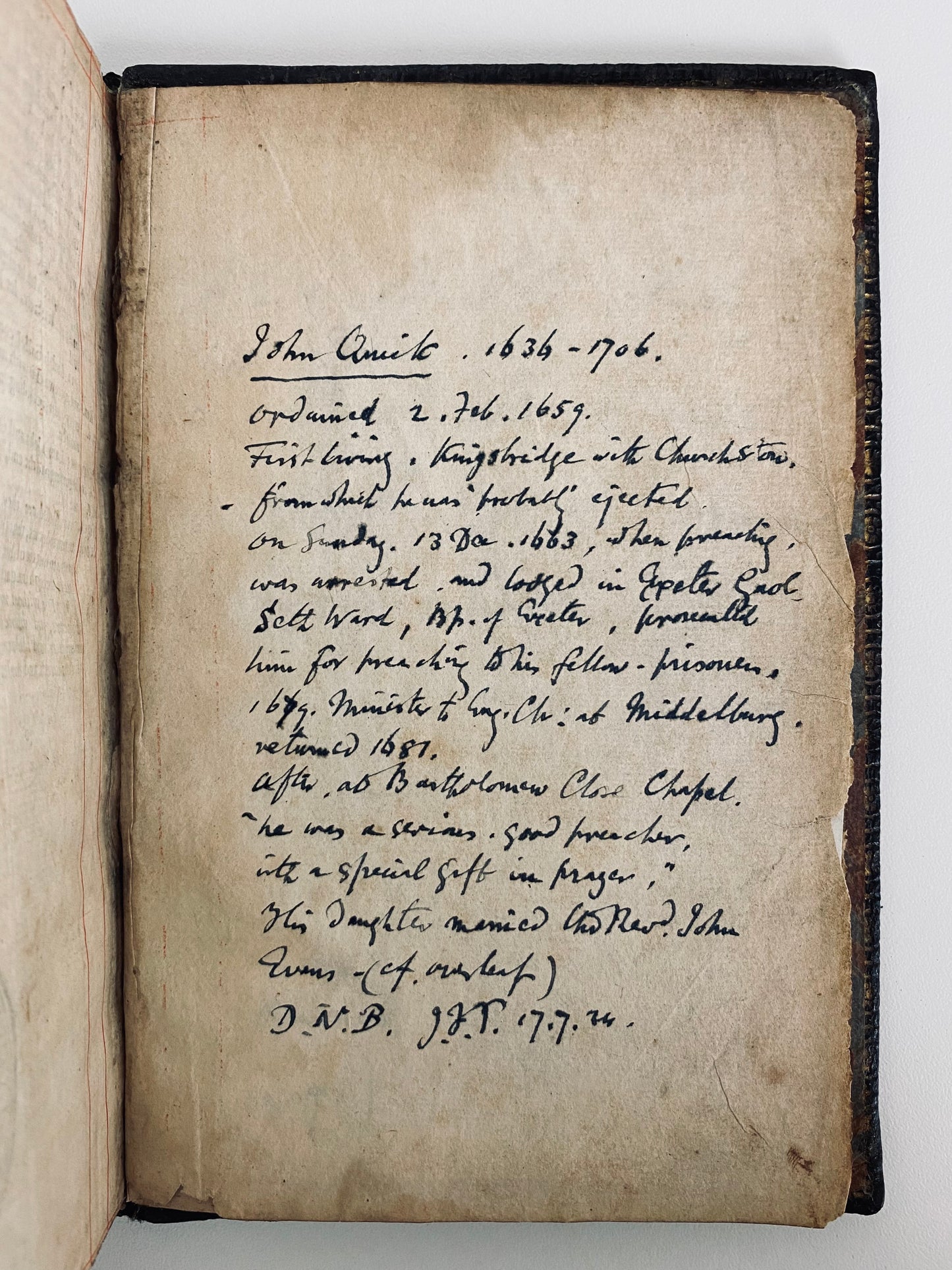Specs Fine Books
1657 HOLY BIBLE. Rare Bible Belonging to John Quick, Puritan Minister Ejected in 1662. Superb!
1657 HOLY BIBLE. Rare Bible Belonging to John Quick, Puritan Minister Ejected in 1662. Superb!
Couldn't load pickup availability
A superb, historic puritan preaching Bible, perhaps the one used by Quick to preach while imprisoned for preaching the Gospel. He was a prominent puritan, twice imprisoned, ejected in 1662, and close friends with Increase and Cotton Mather, etc.
The Holy Bible, Containing the Old Testament and the New. Newly Translated Out of the Original Tongues. And with the Former Translations Diligently Compared and Revised. Cambridge. Printed by John Field. Printer to ye Universities. 1657.
Original tooled calf with hinges overlaid, very attractive. Probably 18th century endpapers. There is a note in the rear that says it was repaired by Quick's grandson, Rev. John Evans [son of his daughter and son-in-law, also Rev. John Evans].
Title relaid withsome losses, red-ruled throughout, stain through Genesis 28, a few corners loss in NT, some affecting text, some curiously repaired and text replaced with superbly executed MSs. This is likely the "curious repair" referred to in the catalogue note in the rear, in the hand of the 19th century James G. Gommin. Also an early excised catalogue entry from Gommin.
John Quick (1636 – 29 April 1706) was an important English puritan divine. After graduating at Oxford in 1657 he was ordained and installed at Ermington in Devon in 1659. This made him neighbors with the prominent devotionalist puritan, John Flavel (1628–91) who ministered at nearby Dartmouth.
He was, along with Thomas Manton, John Owen, Thomas Watson, William Bridge, and nearly 2000 other puritans, infringed upon by the 1662 Act of Uniformity. Like so many, he continued to preach. Unlike many others, he did not simply resign in August and September of 1662. He continued to preach and was therefore arrested mid-service in December of 1663. At his trial, he was nearly acquitted on a technicality, but since he refused to give up preaching, he was sent to prison as a preventative. After eight weeks, he was liberated by Sir Matthew Hale. But Seth Ward, Bishop of Exeter and nemesis to the Puritans, attempted to prosecute Quick for preaching to the prisoners while in jail. He was acquitted.
The Royal Declaration of Indulgence of 1672 brought a brief respite for the persecuted Puritan brotherhood. Quick was licensed to preach again at Plymouth. When restrictions were imposed again the following year, he was again imprisoned, this time for three months, at the Marshalsea prison in Plymouth.
On his release, Quick left the west of England for London. He then traveled to the Dutch Republic where he became a minister to the English church at Middelburg in 1679. Returning to London two years later, Quick gathered a Presbyterian congregation in a small meeting house in Middlesex Court, Bartholomew Close and Smithfield.
Edmund Calamy, the puritan historian, notes that Quick’s ministry in London was “successful to the conversion of many,” He was known as “a serious, good preacher” with a “great facility and freedom in prayer.” He continued to serve his people faithfully until his death on 29 April 1706. His wife Elizabeth died in 1708. Their only daughter became the wife of Dr. John Evans (c. 1680–1730) who completed the Matthew Henry's commentary on the Epistle to the Romans.
Quick was author of the Synodicon in Gallia Reformata - a collection of liturgical texts used by the Huguenots in late 17th-century England. During his early ministry, he became acquainted with the Huguenot refugees, some of whom landed at Plymouth from La Rochelle in 1681—the year the dragonnades began. Quick's interest in the Huguenots did not end with the Synodicon. Besides published sermons of his own, he also prepared for publication a selection of fifty brief biographies of eminent pastors, theologians, and martyrs of the French Reformed Church, the Icones Sacrae Gallicanae.
He also produced a similar selection of twenty Puritans, the Icones Sacrae Anglicanae. It remained unpublished. William Russell, 1st Duke of Bedford (the dedicatee of the Synodicon) had offered to assist with the cost, but passed away in 1700. Following Quick's death, the manuscript volumes were eventually deposited at Dr. Williams's Library in London.
In an interesting connection with early American Puritanism, Quick was a close friend of Increase Mather was it was Quick who received the original sheets of Cotton Mather’s Magnalia Christi from Boston and acquired him a publisher in London. Cotton Mather and Quick also published together The Young Mans Claim Unto the Sacrament of the Lords-Supper [Issued in Boston by Cotton and Increase].
See also: http://biblicalstudies.gospelstudies.org.uk/pdf/eq/1994-4_clifford.pdf
Share




















